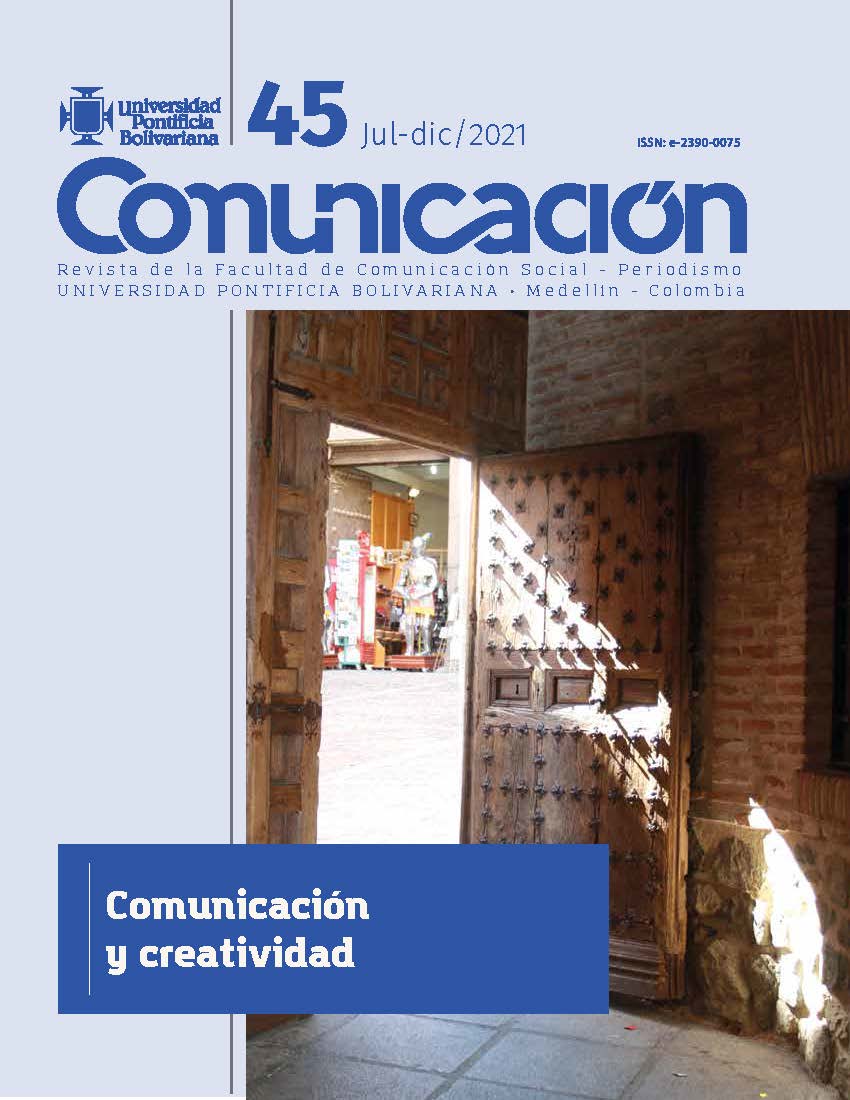Del programa electoral a la campaña política en Twitter Análisis de los datos suscritos a la interacción en Twitter de las campañas ganadoras en Medellín y Bogotá para 2019
Contenido principal del artículo
Resumen
Esta investigación estudia el proceso de transferencia que se produce entre el programa electoral de un candidato a un cargo público, la campaña política y su correspondiente impacto en las redes sociales. Particularmente, evalúa el encuadre, la prominencia y el significado de los mensajes publicados en los entornos virtuales y examina el índice afectivo asignado a la información. El análisis tiene como caso de estudio las elecciones regionales del 27 de octubre de 2019 en Colombia, exactamente las campañas en Twitter de los candidatos ganadores de las alcaldías de Bogotá y de Medellín. El estudio comparativo de las publicaciones de ambos candidatos se hace mediante el uso de la plataforma de análisis de datos Python - Orange3, que incluye modelos matemáticos para el procesamiento del lenguaje natural y el análisis afectivo. El marco conceptual está soportado en la teoría de la agenda setting y el concepto de encuadre del mensaje, desarrollados por McCombs y Evatt; estas nociones permitieron establecer el aporte que ha brindado al debate político el inminente traslado de las contiendas electorales a las redes sociales.
Referencias
Alcaldía de Medellín. (2011). Planificar ciudad con visión compartida. Cartilla guía sobre el proceso participativo de formulación y seguimiento de los planes municipales de desarrollo [PDF]. https://www.medellin.gov.co/irj/go/km/docs/wpccontent/ Sites/Subportal%20del%20Ciudadano/Planeaci%C3%B3n%20Municipal/Secciones/ Publicaciones/Documentos/Otros/Planificar%20ciudad%20con%20visi%C3%B3n%20 compartida.pdf
Alonso Muñoz, L., Miquel Segarra, S. y Casero Ripollés, A. (2016). Un potencial comunicativo desaprovechado. Twitter como mecanismo generador de diálogo en campaña electoral. Revista de Comunicación, (11). https://www.raco.cat/index.php/ObraDigital/article/view/315496
Bogotá Cómo Vamos. (2019). Encuesta de Percepción Ciudadana 2019. https://bogotacomovamos.org/encuesta-de-percepcion-ciudadana-2019/
Boletín informativo Registraduría Nacional del Estado Civil (1 de octubre de 2019). 36.602.752 colombianos están habilitados para votar en las elecciones del 27 de octubre. www. registraduria.gov.co. https://www.registraduria.gov.co/36-602-752-colombianos-estanhabilitados-para-votar-en-las-elecciones-del-27-de.html
Christiano, T. D. (2001). Democracy: Normative Theory. International Encyclopedia of the Social & Behavioral Sciences, Elsevier, 3413-3419 Concejales analizaron de cerca el flagelo de la extorsión en medellín y las acciones para combatirlo (29 de julio de 2020). Concejo de Medellín. Problematica de extorsión en Medellín. https://www.concejodemedellin. gov.co/es/node/6120?language_content_entity=es
Dennison, J. (2019). A review of public issue salience: concepts, determinants and effects on voting. Political Studies Review, 17(4), 436-446. https://doi-org.ezproxy.eafit.edu. co/10.1177/1478929918819264
Entman, R. (1993). Framing: toward clarification of a fractured paradigm. Journal of Communication, 43(4), 51-58.
Gutiérrez Rubí, A. (2011). La política vigilada. La comunicación política en la era de Wikileaks. Editorial UOC.
Gutmann, A. (2007). Democracy. En R. E. Goodin, P. Pettit y T. Pogge (Eds.), A companion to contemporary political philosophy. Oxford, Blackwell.
Hu, M. y Liu, B. (2004). Mining opinion features in customer reviews. Proceedings of AAAI Conference on Artificial Intelligence, 4, 755-760.
Hutto, C., & Gilbert, E. (2014). VADER: A Parsimonious Rule-Based Model for Sentiment Analysis of Social Media Text. Proceedings of the International AAAI Conference on Web and Social Media, 8(1), 216-225. Retrieved from https://ojs.aaai.org/index.php/ICWSM/ article/view/14550
Innerarity, D. (2011). Los límites de la transparencia. El País.
Jungherr, A. (2016). Twitter use in election campaigns: a systematic literature review. Journal of Information Technology & Politics, 13(1), 72-91. https://doi-org.ezproxy.eafit.edu.co/10.1080/19331681.2015.1132401
Mccombs, M. y Evatt, D. (1995). Los temas y los aspectos: explorando una nueva dimensión de la agenda setting. Comunicación y Sociedad, III(1), 7-32.
Medellín Cómo Vamos. (2019). Encuesta de Percepción Ciudadana de Medellín 2019. https://www.medellincomovamos.org/download/presentacion-encuesta-de-percepcionciudadana-de-medellin-2019/
Medina, R. Z. (2015). Los usos políticos de Twitter como herramienta para enmarcar los retos políticos: retos y oportunidades. Discursos mediáticos en contextos electorales.
En Muñiz, C., & Martínez, J. D. (2016). Discursos mediáticos en contextos electorales. Monterrey: Ediciones UANL.I.S.B.N.: 978-607-27-0534-0
Misión de Observación Electoral [MOE]. (2019). Tercer reporte de candidatos a gobernación y alcaldía (capitales de departamento) [PDF]. https://moe.org.co/wp-content/uploads/2019/10/Tercer-reporte-Ingresos-y-Gastos_-elecciones-2019.pdf
Oficina de Estudios Económicos. (2020). CONTEXTO MACROECONÓMICO DE COLOMBIA. www.mincit.gov.co. https://www.mincit.gov.co/getattachment/1c8db89b-efed-46ec-b2a1-56513399bd09/Colombia.aspx
Organización de las Naciones Unidas [ONU]. (s. f.) Objetivos de Desarrollo Sostenible. https://www.un.org/sustainabledevelopment/es/objetivos-de-desarrollo-sostenible/
Parmelee, J. H. (2013). Political journalists and Twitter: Influences on norms and practices. Journal of Media Practice, 14(4), 291–305. https://doi-org.ezproxy.eafit.edu.co/10.1386/jmpr.14.4.291_1Porter, J. (2009). Relationship symmetry in social setworks: Why Facebook will go fullyasymmetric.Bokardo
Pose, J. C. (2002). CASTELLS, Manuel. La Galaxia Internet. Barcelona: Areté, 2001. 316 p. Revista Bibliográfica de Geografía y Ciencias Sociales, Universidad de Barcelona, VII(374). http://www.ub.es/geocrit/b3w-374.htm [ISSN 1138-9796].
Scheufele, D. y Uyengar, S. (2013). The state of framing research: a call for new directions. En K. Kenski y K. H. Jamieson (Eds.), The oxford handbook of political communication theories.
Seeberg, H. B. (2017). How stable is political parties’ issue ownership? A cross-time, crossnational analysis. Political Studies, 65(2), 475-492. https://doi-org.ezproxy.eafit.edu.co/10.1177/0032321716650224
Transparencia por Colombia. (2019). Seguimiento financiación de campañas y rendición de cuentas elecciones territoriales 2019 [PDF]. https://transparenciacolombia.org.co/wpcontent/uploads/informe-no-2-elecciones-2019-1.pdf
Universidad Externado de Colombia. (s. f.). Orientaciones para la formulación de planes de desarrollo 2016-2019 [PDF]. https://www.uexternado.edu.co/wp-content/ uploads/2017/04/GUIA-cordepaz-1.pdf






